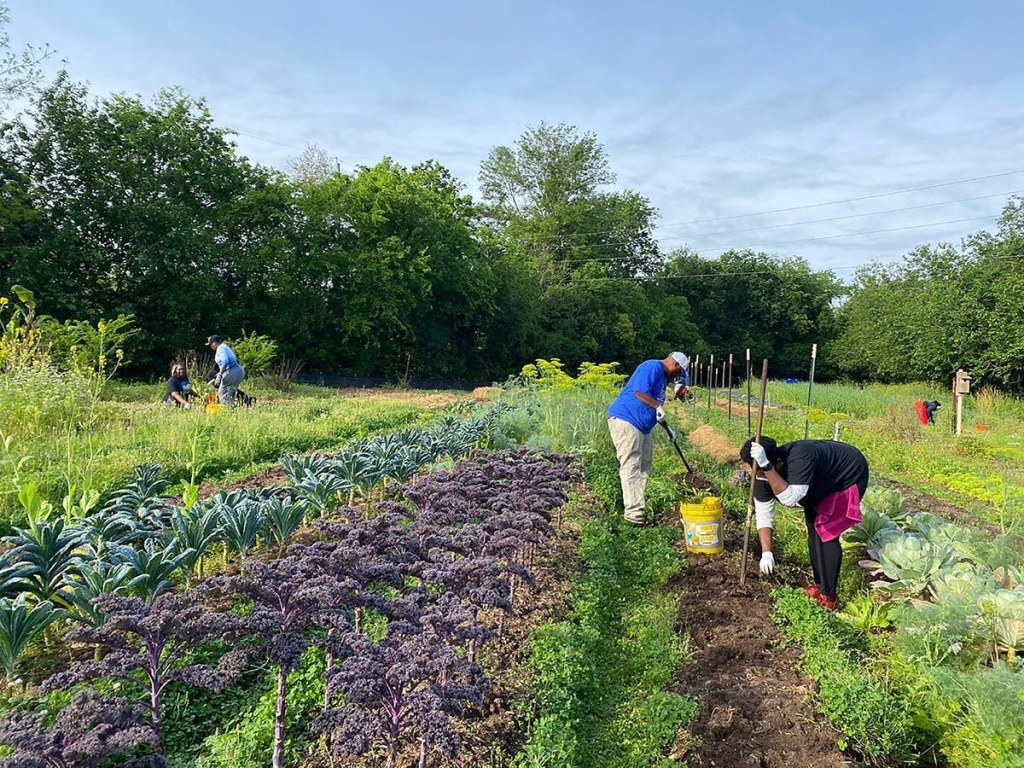Unveiling The Beauty Of Urban Gardens In Jacksonville, FL: Experience The Green Oasis Today!
Urban Gardens Jacksonville FL: Cultivating Green Spaces in the City
Gardening has long been a cherished pastime for many, providing an opportunity to reconnect with nature and cultivate beautiful landscapes. In urban areas like Jacksonville, FL, the concept of urban gardens has gained momentum in recent years. These green spaces not only enhance the aesthetic appeal of the city but also offer numerous benefits to the community. In this article, we will explore the world of urban gardens in Jacksonville, FL, and discover how they contribute to the overall well-being of the city and its residents.
Introduction
Dear Readers,
1 Picture Gallery: Unveiling The Beauty Of Urban Gardens In Jacksonville, FL: Experience The Green Oasis Today!

Welcome to our comprehensive guide on urban gardens in Jacksonville, FL. In this article, we will delve into the fascinating world of sustainable gardening and how it has become a prominent feature of urban landscapes. Whether you are a gardening enthusiast, a nature lover, or someone interested in creating a greener environment, this article will provide you with valuable insights and information about the urban gardens in Jacksonville, FL.
Let’s embark on this green journey together and uncover the wonders of urban gardening!
Table: Urban Gardens Jacksonville FL
Topic
Information

Image Source: jacksonville.com
What
Urban gardens in Jacksonville, FL are community spaces where individuals and groups come together to grow plants and vegetables in an urban setting.
Who
Urban gardens are open to all members of the community, including individuals, families, schools, and organizations. People of all ages and backgrounds can participate in cultivating these green spaces.
When
Urban gardens in Jacksonville, FL operate year-round, with different planting and harvesting seasons depending on the crops being grown.
Where
Jacksonville, FL is home to various urban gardens located throughout the city. These gardens can be found in parks, schools, community centers, and even private properties.
Why
The establishment of urban gardens serves multiple purposes, including promoting sustainable living, fostering community engagement, and providing access to fresh and healthy produce.
How
Urban gardens are created through collaborative efforts between local government, community organizations, and passionate individuals who share a common vision for a greener and more sustainable city.
What are Urban Gardens?
Urban gardens in Jacksonville, FL are vibrant green spaces nestled within the concrete jungle of the city. These gardens are a testament to the human desire to connect with nature and create a sustainable environment. In urban areas where green spaces are limited, urban gardens serve as oases of tranquility and opportunities for individuals to engage in gardening activities.
Urban gardens can take various forms, ranging from community gardens in public parks to rooftop gardens on commercial buildings. These spaces provide an escape from the bustle of city life and offer individuals a chance to cultivate their own piece of nature.
The primary goal of urban gardens is to promote sustainable living practices and enhance the overall quality of life in urban areas. By incorporating green spaces into the cityscape, urban gardens contribute to the well-being of both the environment and the community.
Who Can Participate in Urban Gardening?
Urban gardens in Jacksonville, FL are open to individuals, families, schools, and organizations. Regardless of age or background, anyone with an interest in gardening and sustainability can participate in these green initiatives.
For individuals, urban gardening provides an opportunity to reconnect with nature and learn about the process of plant growth. Families can bond over gardening activities and educate children about the importance of sustainable practices. Schools can incorporate urban gardening into their curriculum, teaching students about biology, nutrition, and environmental stewardship.
Furthermore, organizations can use urban gardens as platforms for community engagement and empowerment. By uniting people under a common cause, these gardens become catalysts for positive change and create a sense of belonging within the community.
When to Engage in Urban Gardening?
Urban gardens in Jacksonville, FL operate year-round, with different planting and harvesting seasons depending on the crops being grown. The city’s warm climate allows for a diverse range of plants and vegetables to thrive throughout the year.
Spring and fall are ideal seasons for planting a variety of crops, including tomatoes, peppers, herbs, and leafy greens. Summer is a time for bountiful harvests, while winter offers the opportunity to grow cool-season crops such as broccoli, kale, and carrots.
Regardless of the season, urban gardens are always bustling with activity and offer a multitude of gardening tasks to engage in.
Where to Find Urban Gardens in Jacksonville, FL?
Jacksonville, FL is home to numerous urban gardens located throughout the city. These gardens can be found in public parks, schools, community centers, and even private properties.
Public parks often have designated areas for community gardens, where individuals and groups can lease plots to grow their own plants. Schools embrace the concept of urban gardens by creating dedicated spaces for students to learn about gardening and sustainable practices.
Community centers act as hubs for urban gardening initiatives, providing resources, workshops, and support for individuals interested in starting their own gardens. Additionally, private properties may open up their spaces for community gardening projects, further expanding the availability of urban gardens in Jacksonville, FL.
Why Establish Urban Gardens in Jacksonville, FL?
The establishment of urban gardens in Jacksonville, FL serves multiple purposes, each contributing to the overall well-being of the city and its residents.
Firstly, urban gardens promote sustainable living practices by reducing the carbon footprint associated with commercial food production and transportation. By growing fruits and vegetables locally, urban gardens minimize the environmental impact and encourage self-sufficiency within the community.
Secondly, urban gardens foster community engagement and social interaction. These green spaces bring people together, promoting a sense of belonging and camaraderie. Individuals from diverse backgrounds can come together and share their knowledge, experiences, and passion for gardening.
Thirdly, urban gardens provide access to fresh and healthy produce. In areas with limited access to grocery stores and fresh produce, urban gardens become invaluable sources of nutritious food. Individuals and families can harvest their own crops, ensuring a steady supply of fresh ingredients for their meals.
Finally, urban gardens enhance the aesthetic appeal of the city. These green spaces add color, texture, and life to urban landscapes, making them more visually appealing for residents and visitors alike. By transforming vacant lots and unused spaces into vibrant gardens, urban gardening initiatives contribute to the beautification of Jacksonville, FL.
How are Urban Gardens Created?
The creation of urban gardens involves collaborative efforts between local government, community organizations, and passionate individuals who share a common vision for a greener and more sustainable city.
Local government plays a crucial role in providing the necessary resources and support for urban gardening initiatives. They allocate land for community gardens, create policies and regulations to facilitate their establishment, and offer financial assistance or grants to individuals and organizations interested in starting their own gardens.
Community organizations act as catalysts for urban gardening, organizing workshops, providing education and resources, and connecting like-minded individuals. These organizations often partner with local businesses and schools to expand the reach and impact of urban gardening initiatives.
Passionate individuals form the backbone of urban gardening projects. They volunteer their time, knowledge, and expertise to cultivate and maintain these green spaces. Through their dedication and enthusiasm, they inspire others to join the urban gardening movement and create a greener future for Jacksonville, FL.
Advantages and Disadvantages of Urban Gardens in Jacksonville, FL
Urban gardens in Jacksonville, FL offer numerous advantages, but they also come with certain challenges. Let’s explore the pros and cons of urban gardening in this vibrant city:
Advantages:
1. Access to Fresh and Nutritious Food: Urban gardens provide individuals and communities with access to fresh, locally grown produce, promoting healthier diets and reducing the reliance on processed foods.
2. Environmental Sustainability: By growing food locally, urban gardens reduce the carbon footprint associated with commercial food production and transportation. They also promote organic gardening practices, minimizing the use of chemical fertilizers and pesticides.
3. Community Engagement and Social Interaction: Urban gardens bring people together, fostering a sense of community and providing opportunities for social interaction. Individuals from diverse backgrounds can learn from one another, share their knowledge, and form lasting connections.
4. Beautification of Urban Spaces: Urban gardens transform vacant lots and unused spaces into vibrant green oases, enhancing the visual appeal of the city. These green spaces create a welcoming environment for residents and visitors, making the city more attractive and livable.
5. Educational Opportunities: Urban gardens serve as outdoor classrooms, offering hands-on learning experiences for individuals of all ages. Schools can incorporate gardening into their curriculum, teaching students about biology, nutrition, and environmental stewardship.
Disadvantages:
1. Limited Space: Urban areas often have limited space, making it challenging to find suitable locations for urban gardens. The availability of land may restrict the number of gardens that can be established, limiting participation and access for interested individuals.
2. Soil Contamination: In some urban areas, the soil may be contaminated with pollutants, posing a risk to the health of plants and individuals. Proper soil testing and remediation measures are necessary to ensure the safety of urban gardens.
3. Maintenance and Upkeep: Urban gardens require regular maintenance and upkeep to thrive. This includes watering, weeding, pest control, and general maintenance tasks. The commitment and dedication of individuals involved in urban gardening are essential for the long-term success of these green spaces.
4. Limited Growing Seasons: In certain climates, the growing season for urban gardens is limited, reducing the variety of crops that can be grown throughout the year. Extending the growing season through the use of greenhouses or indoor gardening techniques can help overcome this limitation.
5. Community Engagement: While urban gardens provide opportunities for community engagement, it can be challenging to sustain interest and involvement over the long term. Ongoing efforts are required to ensure the continued participation and support of individuals and organizations.
Frequently Asked Questions (FAQ)
1. Are urban gardens in Jacksonville, FL open to everyone?
Yes, urban gardens in Jacksonville, FL are open to individuals, families, schools, and organizations. People of all ages and backgrounds are encouraged to participate in urban gardening initiatives.
2. Can I grow my own food in an urban garden?
Absolutely! Urban gardens provide individuals with the opportunity to grow their own fruits, vegetables, and herbs. You can cultivate your own piece of nature and enjoy the bountiful harvests.
3. How can I get involved in urban gardening in Jacksonville, FL?
There are several ways to get involved in urban gardening in Jacksonville, FL. You can join an existing community garden, start your own garden, volunteer at local gardening events, or participate in workshops and educational programs offered by community organizations.
4. Are urban gardens in Jacksonville, FL sustainable?
Yes, urban gardens in Jacksonville, FL are a sustainable solution to promote local food production, reduce carbon emissions, and foster community engagement. By incorporating environmentally friendly practices, urban gardens contribute to the overall sustainability of the city.
5. Can I use chemicals in my urban garden?
While it is recommended to practice organic gardening methods in urban gardens, the use of chemicals is a personal choice. However, it is important to follow safe and responsible practices when using any chemicals to minimize potential harm to plants, individuals, and the environment.
Conclusion
In conclusion, urban gardens in Jacksonville, FL play a vital role in creating a sustainable and vibrant city. These green spaces not only provide access to fresh and healthy produce but also foster community engagement, promote sustainable living practices, and enhance the aesthetic appeal of the city. By participating in urban gardening initiatives, individuals can contribute to the overall well-being of the community and create a greener future for Jacksonville, FL.
So, why wait? Start your urban gardening journey today and become a part of the growing movement towards a sustainable and thriving city!
Final Remarks
Dear Readers,
We hope this article has provided you with valuable insights and information about urban gardens in Jacksonville, FL. By cultivating these green spaces, we can transform our city into a greener and more sustainable place to live.
Remember, urban gardening is not just about growing plants; it is about cultivating a sense of community, promoting environmental stewardship, and creating a better future for ourselves and future generations.
Let’s join hands and sow the seeds of change in Jacksonville, FL!
This post topic: Gardens


